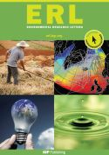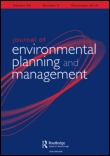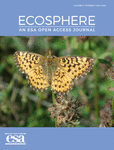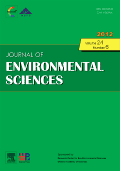
Annual Review of Environment and Resources
Scope & Guideline
Uncovering trends that shape our planet's future.
Introduction
Aims and Scopes
- Interdisciplinary Environmental Science:
The journal publishes articles that synthesize knowledge across various disciplines related to environmental science, ecology, and resource management, promoting a holistic understanding of complex environmental issues. - Sustainability and Climate Change Mitigation:
There is a strong focus on sustainability practices, climate change mitigation strategies, and adaptation measures, highlighting innovative approaches to reduce ecological footprints and enhance resilience. - Human-Environment Interactions:
Research exploring the interplay between human activities and environmental systems is a core theme, addressing social, economic, and cultural factors that influence resource use and environmental policies. - Policy and Governance:
The journal emphasizes the importance of effective governance and policy frameworks in managing environmental resources, showcasing studies that assess regulatory frameworks, stakeholder engagement, and conservation strategies. - Biodiversity and Ecosystem Services:
There is a consistent focus on biodiversity conservation and the sustainable management of ecosystem services, addressing the impacts of anthropogenic activities on ecological health and resilience.
Trending and Emerging
- Climate Adaptation Strategies:
There is an increasing focus on adaptive strategies that communities and ecosystems can employ in response to climate change, emphasizing resilience, risk management, and proactive planning. - Urban Sustainability and Resilience:
Research on sustainable urban transitions, including health, equity, and climate resilience, is gaining traction as cities confront growing environmental challenges and strive to implement comprehensive sustainability strategies. - Technological Innovations for Sustainability:
The integration of technology, such as machine learning and renewable energy solutions, is emerging as a key theme, with studies exploring how these innovations can enhance environmental sustainability and resource management. - Environmental Justice and Equity:
A growing emphasis on environmental justice highlights the importance of addressing disparities in environmental impacts and resource access, promoting inclusive approaches to sustainability that consider marginalized communities. - Biodiversity and Ecosystem Restoration:
There is a notable increase in research focused on biodiversity restoration and conservation, reflecting the urgent need to address biodiversity loss and the role of ecosystems in climate change mitigation.
Declining or Waning
- Traditional Resource Management Practices:
Topics related to conventional resource management strategies are less frequently addressed, as the emphasis shifts towards innovative and sustainable practices that incorporate modern technologies and community engagement. - Historical Environmental Studies:
Research focusing on historical environmental data and analyses seems to be waning, possibly due to a growing preference for applied research that addresses current and future challenges rather than retrospective studies. - Single-Sector Approaches:
There is a noticeable decline in publications that tackle environmental issues from a single-sector perspective, as the journal increasingly favors interdisciplinary approaches that integrate multiple sectors and dimensions of sustainability. - Static Environmental Assessments:
Static assessments of environmental conditions without dynamic modeling or projections are becoming less common, reflecting a shift towards more dynamic and predictive analyses that consider future scenarios and uncertainties.
Similar Journals

Environmental Research Letters
Advancing solutions for a sustainable future.Environmental Research Letters is a premier, peer-reviewed journal published by IOP Publishing Ltd based in the United Kingdom, dedicated to advancing the field of environmental science. With an impressive Impact Factor and consistently ranked in the Q1 category for its focus on Environmental Science, Public Health, and Renewable Energy, this open-access journal has been a vital resource for researchers and practitioners since its inception in 2006. Covering a wide scope of topics including sustainability, environmental health, and innovative energy solutions, ERL aims to promote discourse and disseminate groundbreaking research that addresses global environmental challenges. As a leader in the field, it holds prestigious positions in Scopus rankings, ensuring that published works reach a wide audience, thus driving impactful change. Researchers, professionals, and students alike will find valuable insights and essential knowledge within its pages, making it a keystone publication for anyone invested in environmental advancements.

Euro-Mediterranean Journal for Environmental Integration
Bridging Disciplines for Sustainable Development in the Euro-MediterraneanThe Euro-Mediterranean Journal for Environmental Integration, published by SPRINGER HEIDELBERG, serves as a pivotal platform for interdisciplinary research in the realm of environmental science, particularly focused on the unique ecological and socio-economic context of the Euro-Mediterranean region. With its ISSN 2365-6433 and E-ISSN 2365-7448, this journal aims to foster a collaborative approach to environmental challenges, integrating insights from various fields such as ecology, geography, and sustainable development. Since its inception in 2016, it has made significant strides, achieving a Q3 ranking in Environmental Science and maintaining a notable position within the Scopus rankings, sitting at #102 out of 233 in the general environmental science category, which reflects its growing influence in academic discourse. The journal is committed to open dialogue among researchers, professionals, and students aimed at advancing knowledge and promoting innovative solutions to pressing environmental issues. Access to its comprehensive articles and findings will be key to contributing to a more sustainable future.

Journal of Environmental Planning and Management
Exploring the intersection of policy and environmental science.The Journal of Environmental Planning and Management, published by Routledge Journals, Taylor & Francis Ltd, is a leading academic journal dedicated to advancing the field of environmental science through innovative research and critical analysis. With a robust impact factor and categorized in Q1 across multiple disciplines, including Environmental Science, Geography, and Fluid Flow, this journal holds a prestigious position in the academic community. It serves as a vital platform for researchers, professionals, and students interested in the complexities of environmental management, policy, and planning, promoting insightful discourse on sustainable practices and innovative solutions. Although the journal does not currently offer Open Access options, it remains widely accessible through institutional subscriptions, ensuring that pertinent research reaches a broad audience. Since its inception in 1992, the journal has shown a commitment to excellence, making significant contributions to our understanding of environmental issues and the interplay between human activity and natural systems. The Journal of Environmental Planning and Management invites submissions that not only push the boundaries of existing knowledge but also foster interdisciplinary collaboration in the quest for sustainable development.

One Earth
Championing impactful research for our shared planet.One Earth is a premier academic journal published by Cell Press, dedicated to advancing research in the fields of Earth and Planetary Sciences as well as Environmental Science. With an impactful presence in the academic community and an impressive ranking, One Earth has achieved Q1 status in both Earth and Planetary Sciences and Environmental Science, showing its commitment to the highest standards of scholarly excellence. Founded in 2019, this journal has quickly established itself as a leading platform for groundbreaking research, contributing to the global conversation on sustainability and environmental stewardship. With a distinguished Scopus rank placing it in the 99th percentile among Earth and Planetary Sciences and the 97th percentile in General Environmental Science categories, One Earth aims to disseminate cutting-edge findings and foster innovative approaches to address pressing global challenges. The journal is indexed with an ISSN of 2590-3330 and an E-ISSN of 2590-3322, supporting a broad audience of researchers, professionals, and students passionate about ecological integrity and planetary health.

ENVIRONMENTAL REVIEWS
Fostering Innovation in Environmental DiscourseENVIRONMENTAL REVIEWS, published by Canadian Science Publishing, is a leading academic journal dedicated to the field of Environmental Science. With an impressive 2023 Q1 ranking in Environmental Science (miscellaneous) and a Scopus rank of #30 out of 233, it reflects the journal's substantial influence and contribution to the discourse on environmental issues. Launched in 1993, this journal provides a platform for critical reviews and innovative research in areas ranging from ecological sustainability to environmental policy, ensuring that it remains at the forefront of scientific inquiry. Although it currently does not offer open access, ENVIRONMENTAL REVIEWS continues to cater to a diverse readership of researchers, professionals, and students, fostering knowledge exchange essential for tackling contemporary environmental challenges. This journal not only strives to disseminate crucial findings but also aims to inspire informed decision-making and practical solutions to promote ecological welfare.

Ecosphere
Championing impactful research in environmental science.Ecosphere is a leading open-access journal published by WILEY, dedicated to advancing research in the fields of ecology, evolution, behavior, and systematics. Established in 2010 and headquartered in the United States, this innovative journal provides a platform for the exchange of cutting-edge scientific knowledge and discovery, fulfilling its mission to enhance our understanding of ecological systems and their interactions. With a prestigious impact factor reflecting its commitment to high-quality research, Ecosphere is ranked Q1 in both Ecology and Ecology, Evolution, Behavior, and Systematics for 2023, further solidifying its prominence in the scientific community. The journal's scope includes a wide array of topics related to environmental science, making it an essential resource for researchers, professionals, and students aiming to stay at the forefront of ecological research. It offers comprehensive open access options, ensuring that groundbreaking findings are readily available to a global audience, thus fostering collaboration and innovation in the field.

Acta Scientiarum Polonorum-Formatio Circumiectus
Advancing ecological insights for a sustainable future.Acta Scientiarum Polonorum-Formatio Circumiectus is a distinguished open-access journal published by WYDAWNICTWO UNIWERSYTETU ROLNICZEGO HUGONA KOLLATAJA KRAKOWIE, dedicated to advancing knowledge in the fields of ecological modeling, environmental engineering, nature and landscape conservation, and water science and technology. With a commitment to accessibility since its inception in 2006, this journal provides a platform for researchers, professionals, and educators to disseminate their findings to a global audience. Although currently categorized in the Q4 quartile across various ecological disciplines, the journal's aim is to foster critical discussions and innovative approaches to pressing environmental challenges. The journal is based in Poland, and its scope encompasses a wide array of research areas pertinent to contemporary environmental studies. Acta Scientiarum Polonorum serves as an essential resource in its field, encouraging empirical research and theoretical advancements that collectively contribute to sustainable development and environmental stewardship.

ENVIRONMENTAL MANAGEMENT
Championing impactful research in ecology and pollution.ENVIRONMENTAL MANAGEMENT, published by Springer, stands at the forefront of advancing sustainability and ecological stewardship in the fields of Ecology, Global and Planetary Change, and Pollution. With an impressive tracking history from 1977 to 2024 and prestigious quartile rankings reflecting its significant impact (Q1 in Ecology and Q2 in both Global and Planetary Change and Pollution), this journal engages a wide range of stakeholders, including researchers, policymakers, and environmental professionals. The journal is a vital resource for those dedicated to addressing pressing global environmental challenges, publishing rigorous interdisciplinary research that informs policy and practice. While it does not offer open access, its content remains accessible through institutional subscriptions. Located in the heart of New York, ENVIRONMENTAL MANAGEMENT is dedicated to fostering a substantive dialogue on innovative approaches to environmental preservation and management.

Journal of Environmental Sciences
Exploring Solutions to Global Environmental ChallengesJournal of Environmental Sciences, published by SCIENCE PRESS, is a premier scholarly journal dedicated to advancing knowledge in the multidisciplinary fields of environmental science, environmental chemistry, and environmental engineering. Established in 1970 and based in Beijing, China, this journal has consistently garnered recognition for its high-quality research, demonstrated by its Q1 rankings across multiple categories, including Environmental Chemistry, Environmental Engineering, and General Environmental Science. With an impressive Scopus rank of #11 for Environmental Science, the journal has firmly positioned itself within the top tier of its field, attracting contributions from leading researchers and academics worldwide. Although it operates under subscription access, the journal's commitment to disseminating critical insights into pressing environmental issues makes it an invaluable resource for professionals, researchers, and students striving to make impactful contributions to the understanding and management of environmental challenges.

Ecological Indicators
Innovating insights into biodiversity and ecosystem health.Ecological Indicators, published by Elsevier, is a prestigious journal dedicated to advancing the fields of ecology and environmental science. With an impressive impact factor and ranked in the Q1 quartile for both Ecology and Decision Sciences categories, the journal serves as a vital resource for researchers and professionals aiming to apply ecological knowledge to real-world problems. The journal covers a broad scope of topics within ecological indicators, aiming to provide comprehensive insights into biodiversity, ecosystem health, and sustainability metrics. Founded in 2001 and continuing through 2024, Ecological Indicators has established itself as a leader in disseminating significant research and innovative findings. The journal's standing is reflected in its remarkable Scopus ranks, placing it among the top percentile in its respective categories. Authors are encouraged to submit their work to share vital findings with an engaged audience of researchers, professionals, and dedicated students, ensuring the continued relevance and impact of ecological research on global environmental policies and practices.